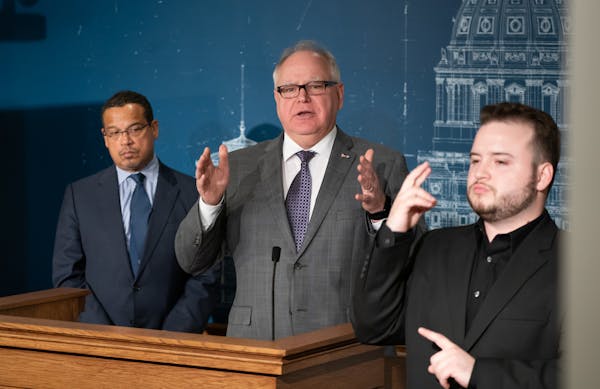Minnesota has no law against price gouging, but the widening coronavirus pandemic has led to an unprecedented number of complaints and actions by state officials against businesses seeking "unconscionably excessive" profit.
In the past three weeks, the Minnesota Attorney General's Office has logged more than 700 reports of excessive pricing on food staples, toilet paper, cleaning supplies and more.
The Attorney General's Office has taken legal action against at least two Minnesota businesses and sent "resolution letters" to 20 others that have agreed to bring pricing back in line.
Attorney General Keith Ellison also has sent a warning letter to Menards for what he described as "excessively increased" prices on face masks, Formula 409 cleaner and Clorox bleach.
Ellison said most retailers "are doing the right thing by Minnesotans" while others may not know that their attempts to cash in could have legal consequences.
"But if you're profiteering off the pandemic," Ellison said in a statement, "my office and I are coming after you."
Minnesota is one of 16 states with no law against price gouging. But a March 20 executive order from Gov. Tim Walz gave Ellison authority to crack down on excessive pricing on goods needed for the health and welfare of the public.
Ellison's investigators have reported seeing a 36-pack of toilet paper selling for $80, a can of Lysol priced at $11, and a refill of Purell soap that normally sells for about $16 going for $42.
The number of complaints has skyrocketed from about 150 since the order was issued, as Ellison has encouraged consumers through social media and the state's website to report over-the-top pricing.
The complaints began with staples such as rice, butter, bottled water and toilet paper. They quickly expanded to include other cleaning, hygiene and medical products such as hand sanitizer, bleach and masks, said John Stiles, a spokesman for Ellison.
In recent days the office has started to receive complaints about the price of eggs and meat.
Ellison has pledged to investigate every complaint, and has deployed secret shoppers to follow up on 90 of them so far.
His office has reached settlements with two companies: Dragon Door Publications, Inc., a Little Canada-based online retailer of exercise and weightlifting equipment, and Downtown Smoke Shop in St. Paul.
The investigation into potential price-gouging at Menards was related to products sold in Rochester and other stores in Minnesota, according to a letter Ellison sent to Chief Executive John Menard last week. The Michigan attorney general also has notified the retailer of similar complaints.
"We have taken this order very seriously as we have been the low-price leader for years," a Menards spokesman said in a statement. "This is how we built our business. Everybody runs a bad play once in a while. We have reminded everyone on our team that being the low-price leader is, has been and always will be our goal."
The Eau Claire, Wis.-based retailer could face civil penalties of up to $10,000 per unlawful sale or transaction.
Many economists argue against price-gouging bans, seeing price hikes — even during times of calamity — as capitalism's basic forces of supply and demand in action.
Higher prices on sought-after goods discourages hoarding, they say, and ultimately directs goods and services where they are most needed as businesses focus their efforts where they can reap the most profit.
Walz and Ellison said they aim to take action against those acting outside the bounds of free marketplace principles.
Walz's order defines an "unconscionably excessive price" as having a gross disparity between the price of the good or service sold now compared to its price 30 days before March 13, when the state declared a peacetime emergency.
Businesses that price goods 20% higher than usual or grossly exceed those at nearby competitors could also be in violation.
Jackie Crosby • 612-673-7335
Twitter: @JackieCrosby

Want to share info with the Star Tribune? How to do it securely

'Safe recovery sites' would offer syringes, naloxone and more to people using drugs. The plan could be in peril.
New Minnesota GOP leaders seek peace with party's anti-establishment wing

Who is Republican Lisa Demuth, Minnesota's first House speaker of color?

